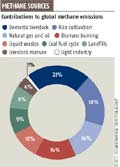|
Crucially, the team found that adding fish oil did not disrupt normal digestion, a major problem with previous attempts to suppress methane production by means of an oily diet. "That's hitherto been the biggest obstacle," says Jamie Newbold of the Rowett Research Institute in Aberdeen, Scotland, whose team is developing a powdered bacterial additive to achieve the same effect (New Scientist print edition, 15 April 2000).
Fievez and her team suspect fish oil could have other benefits too. When they examined stomach contents from sheep fed on the new diet, it proved to be much richer than usual in omega-3 fatty acids and other polyunsaturated fats that are thought to help reduce cholesterol. Their hope is that meat and other produce from animals fed on fodder laced with fish oil might also have higher levels of these "good" fats, making it healthier to eat.
Acutely aware that some fish stocks are becoming seriously depleted, Fievez says it might be possible to extract the key oils from algae or minute oil-rich crustaceans called copepods, rather than fish.
One concern with the fishy diet is that produce such as meat and milk might end up smelling of fish. Fievez and her colleagues plan to examine the fatty acid profile of the produce and test its "fishiness" on a panel of tasters.
|
